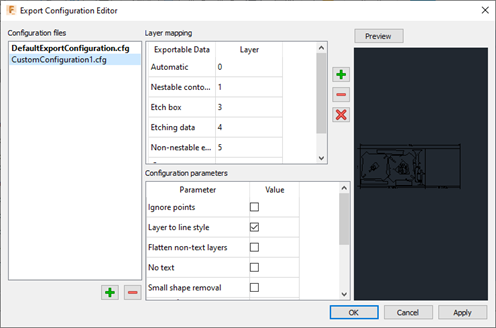Export Configuration Editor reference
This feature is part of an extension. Extensions are a flexible way to access additional capabilities in Fusion. Learn more.
This reference topic describes the Export Configuration Editor dialog that opens when you export a nest to a DXF file. To work with the Export Configuration Editor, you need to have created a nest study and be in the process of exporting a nest study.


A configuration file is a customizable set of instructions on how to export nest data. For example, it can define that the fifth layer of a DXF file contains geometry that should be excluded from the nest. Fusion Nesting includes a default configuration file. You cannot edit this file, but you can create customized versions of it to match your workflow. If you consistently use the same mappings in your work, you likely will not need to make changes to a configuration file once you create one that works for you.
Configuration Files
This section of the dialog lists the configuration files available to you. The active configuration is bolded.
- Double-click: Set a configuration file as active.
 Create: Create a configuration file using the current settings in the dialog.
Create: Create a configuration file using the current settings in the dialog. Delete: Delete the selected configuration file.
Delete: Delete the selected configuration file.
Layer mapping
Use this table to control how values are mapped to layers during export.
- Exportable Data column: Nest data types available for mapping; for example, etch box, grain, and so on.
- Target Layer Name column: The layers to which entities will be extracted.
 Add a layer row to the table.
Add a layer row to the table. Remove the selected layer row from the table.
Remove the selected layer row from the table. Remove all layer rows.
Remove all layer rows.
These are the default mappings commonly used in CAD workflows.
| Layer | Nesting Entities | CAD Elements |
|---|---|---|
| 0 | Automatic | |
| 1 | Nestable contours | Circles, lines, arcs, polylines and text |
| 3 | Etch box | Lines, arcs and polylines |
| 4 | Etching data | Lines, arcs, circles, polylines and text |
| 5 | Non-nestable entities; area for these elements is still calculated | Lines, arcs, circles, polylines and text |
| 6 | Extra data | Lines, arcs, circles, polylines and text |
| 14 | Grain | |
| 15-99 | Junk | Not shown at all |
| 251 | Ignored for nesting purposes | Shown on geometry sources, but not used in nests |
Configuration Parameters
Set parameters in the configuration file; for example, "No Text" to eliminate text during export. Hover the mouse pointer over each parameter for descriptions.
Preview
Preview the results of the export.